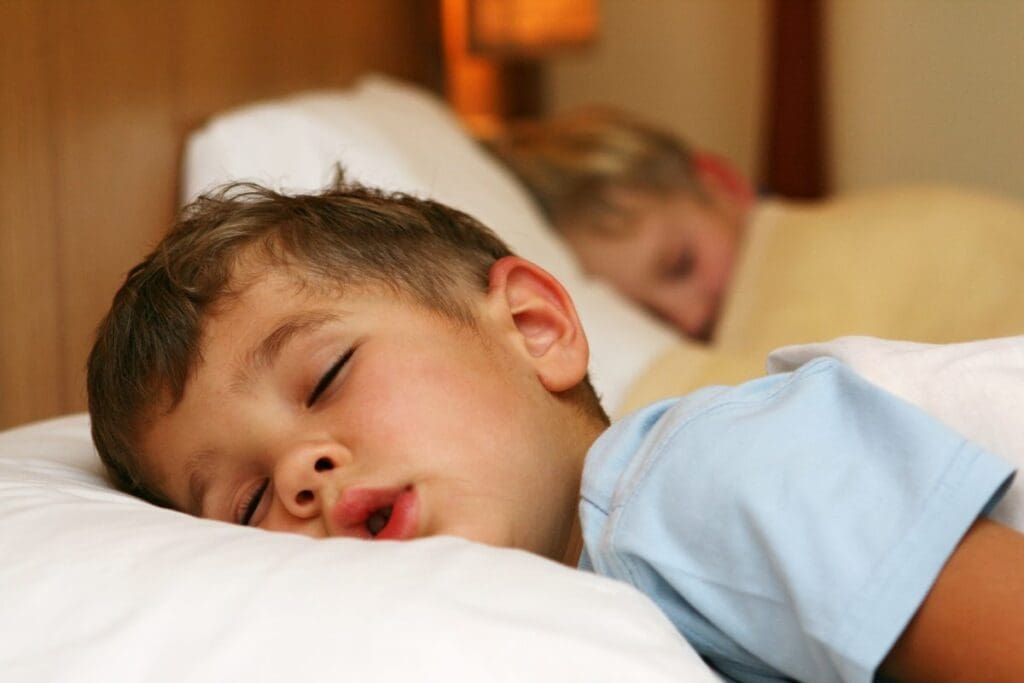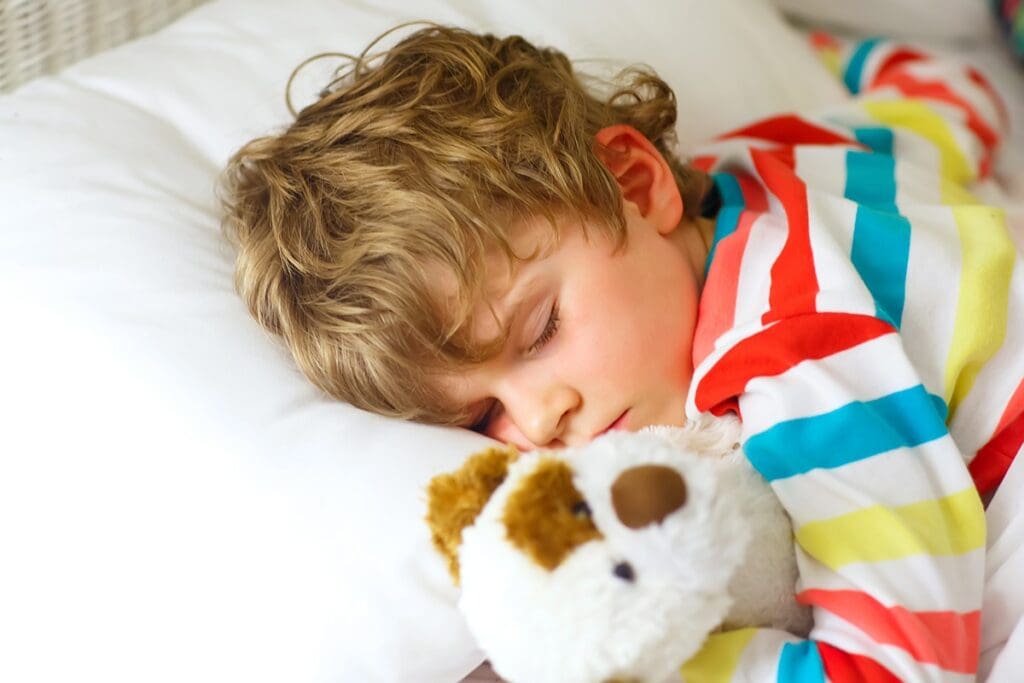Last Updated on November 20, 2025 by

Children around 8 years old often have trouble sleeping, and understanding 8 sleeping patterns can help parents handle bedtime challenges better. Studies show that about 29.4% of kids aged 6–13 resist bedtime, making it tough for parents to get them to sleep smoothly.
At this age, kids take longer to fall asleep, and bedtime anxiety becomes a major issue. This can make children moody, affect their learning, and even harm their health. Knowing more about 8 sleeping habits can help parents create better routines and improve their child’s rest.
Dealing with an 8-year-old who won’t sleep can be stressful. At Liv Hospital, we focus on modern sleep hygiene methods and team-based care to tackle sleeplessness effectively and help children rest well.
It’s important to understand sleep issues in school-age kids. Sleep is key for their growth, mental health, and school success. As they face school and social life, they need enough sleep to do well.
Many school-age kids have sleep problems. About 28-34% get less than 8 hours of sleep, which is not enough. Around 29.4% of kids aged 6-13 have trouble going to bed, making it a big challenge for parents.
Not enough sleep can make kids cranky and emotional. It’s vital to make sure they get enough sleep to avoid these issues.

Kids aged 6-12 need 9 to 12 hours of sleep each night. An 8-year-old should aim for at least 9 hours. A regular bedtime routine and a sleep-friendly room can help.
When figuring out sleep needs, consider your child’s activity level and health. By focusing on sleep, parents can help their kids develop good sleep habits for life.
Key Sleep Recommendations:
Sleep issues in 8-year-olds come from many causes. It’s key to find out why. Knowing these reasons helps us find ways to improve their sleep.
Too much screen time before bed is a big problem. Blue light from screens can stop melatonin production. This makes it tough for kids to fall asleep.
Studies show that 92–96% of kids use screens before bed. This is a big issue.
To fix this, parents should make screen-free zones and times, like before bed. Encouraging calm activities before bed also helps.
Unpredictable bedtime routines confuse kids. This makes it hard to get a regular sleep schedule. Poor sleep environments also hurt sleep quality.
The bedroom’s environment is key for good sleep. Noise, light, and temperature can mess with sleep. Making the bedroom dark, quiet, and cool improves sleep a lot.

Anxiety and stress are big problems for kids. School pressures, social issues, and family problems can make bedtime hard.
“Children often reflect the stress and anxiety they experience during the day at night, making it challenging to relax and fall asleep.”
Talking about these issues and teaching relaxation techniques can help with bedtime anxiety.
By tackling these common problems, parents can help their 8-year-old sleep better. It’s about making a good sleep environment, sticking to routines, and managing screen time and anxiety.
Many physical factors can impact your child’s sleep. A regular bedtime routine is key. But diet and health issues also play big roles in sleep quality.
The food your child eats, including evening snacks, affects sleep. High-sugar foods and drinks before bed can make it hard to fall asleep. Also, eating too much or too richly before bed can cause stomach problems and disrupt sleep.
Make sure your child’s dinner is balanced and not too heavy. A light, healthy snack before bed, like a banana or warm milk, is good. Try to avoid caffeinated drinks and foods with added sugars.
Some medical conditions can really mess with a child’s sleep. Kids with attention deficit hyperactivity disorder (ADHD) might have trouble sleeping because of their condition or medication. Other issues like asthma, allergies, or sleep disorders can also mess with sleep.
It’s important for parents to work with their child’s doctor to manage these conditions. Changing medication times or treating health problems can help improve sleep. For more info, check out Sleep Foundation’s guide on children and sleep.
By tackling these physical factors, you can make your child’s sleep environment better. This can lead to better rest and healthier growth.
Understanding why kids resist bedtime is key to helping them sleep better. Bedtime anxiety and resistance can come from many sources. These include separation anxiety, nighttime fears, and the need to test boundaries.
Many kids struggle with separation anxiety. This fear makes it hard for them to sleep without their parents. Nighttime fears, like the dark or monsters, also play a role.
To help, parents can create a soothing bedtime routine. This can include reassurance and comfort. A nightlight or a small comfort object, like a stuffed animal, can ease fears.
As kids grow, they want to be more independent. This can lead to resistance to bedtime. They test boundaries to learn what’s okay and what’s not.
Being consistent is important. A clear bedtime routine helps kids know what’s expected. Giving them some choices, like picking a book, can also help.
Bedtime anxiety in older kids can be caused by many things. This includes school worries, social issues, and family problems. Kids may worry about school, friends, or family conflicts.
Parents can make bedtime calm and encourage kids to share their worries. Knowing what time a 9-year-old should go to bed helps plan a good bedtime routine. This ensures they get enough sleep.
Dealing with bedtime anxiety needs empathy and understanding. By listening to their fears and worries, parents can help kids cope. This improves their sleep quality.
Improving sleep habits in kids needs a few key steps. These include setting regular sleep times, cutting down on screen use, and making their bedroom comfy. By doing these things, we help kids sleep better, which is key for their health.
It’s important to have a bedtime routine that works for kids. This routine should be calm and signal it’s time to sleep. Practice consistent sleep patterns with your child, aiming for a bedtime between 8:30-9 pm, and maintain a consistent wake time in the morning.
A good bedtime routine might include reading, a warm bath, or gentle stretches. It’s also key to be a sleep role model for your child. As LivHovspital says, keeping up with sleep hygiene is vital for healthy sleep.
Limiting screen time is key to good sleep. The blue light from screens can mess with sleep hormones. Remove technology from bedrooms to cut down on distractions and blue light before bed.
Setting digital limits means no screens in the evening. Instead, encourage reading, puzzles, or other relaxing activities. These help signal it’s time to sleep.
“The American Academy of Pediatrics recommends no screen time for children aged 2-5 years, except for video chatting, and consistent limits on screen time for older children.”
A sleep-friendly bedroom is vital for good sleep. It should be dark, quiet, and at a comfy temperature. A sleep-friendly environment can significantly improve the quality of sleep.
It’s also important to think about the psychological side of sleep. Making sure the child feels safe and secure in their bedroom can help reduce bedtime anxiety and stress.
By following these steps, we can help kids sleep better. It’s about setting a regular sleep schedule, managing screen time, and making their bedroom sleep-friendly.
It’s key to help your child sleep well for their growth. Not enough sleep can make them tired, affect their thinking, mood, and schoolwork. As kids get older, their sleep needs change, and sleep issues in teens are common. Setting a regular bedtime for 10-year-olds helps them sleep better later on.
Knowing what affects sleep and finding ways to fix it can help your child sleep well for life. At LivHospital, we offer care and advice to support your child’s health. By making their sleep space cozy and limiting screen time, your child can sleep better.
Good habits can help kids sleep well at any age. We help families build these habits for better health and growth.
Kids aged 6-12 need 9-12 hours of sleep each night. Getting the right sleep is key for their brain, mood, and schoolwork.
To tackle bedtime anxiety, start a bedtime routine with calm activities like reading. Make their bedroom sleep-friendly and talk about any fears they have.
Diet and health issues can mess with your child’s sleep. Avoiding heavy or sugary snacks at night and managing health problems is important.
Set screen-free times and zones to help your child sleep better. Relaxing activities before bed and avoiding blue light from screens also help.
Signs of sleep regression include trouble falling asleep and waking up a lot at night. Check their sleep space, routine, and health to fix it.
Make their bedroom dark, quiet, and cool. Use curtains, a white noise machine, or a fan for a calm atmosphere. A comfy mattress and pillows also help.
For an 8-year-old, bedtime should be between 7:00-9:00 PM. This allows for 9-12 hours of sleep. Stick to a bedtime routine every day, even on weekends.
Create a bedtime routine and a sleep-friendly room. Encourage healthy sleep habits like no screens before bed and regular exercise.
Lack of sleep can harm a child’s brain, mood, and schoolwork. It can also lead to sleep disorders, anxiety, and mental health problems later.
Understand why your teen is sleepless, like stress or irregular sleep. A consistent sleep schedule, a sleep-friendly room, and healthy sleep habits can help.
Paruthi, S., **S. **A. Brooks, L. J., **S. **A. D. D. (2016). Recommended amount of sleep for pediatric populations: a consensus statement of the American Academy of Sleep Medicine. Journal of Clinical Sleep Medicine, 12(6), 785-786. https://doi.org/10.5664/jcsm.5866
Mindell, J. A., **S. **A. Sadeh, A., **S. **E. M. D. E. M. E. (2015). A multinational survey of pediatric sleep habits: problems and solutions. Sleep Medicine, 16(10), 1221-1229. https://doi.org/10.1016/j.sleep.2015.06.012
Mindell, J. A., **S. **T. Leichman, L. M., **S. **D. D. A. (2017). The effectiveness of a bedtime routine on sleep in young children: a meta-analysis. Journal of Pediatric Psychology, 42(7), 785–797. https://doi.org/10.1093/jpepsy/jsw062
Hale, L., **S. **J. W. J. W. (2018). Screen time and sleep: a systematic review and meta-analysis of the research. Sleep Medicine Reviews, 39, 137–152. https://doi.org/10.1016/j.smrv.2017.06.007
Alfano, C. A., & Genet, J. (2018). Sleep and anxiety in youth: a review of the research and treatment literature. Current Opinion in Psychology, 20, 124–130. https://doi.org/10.1016/j.copsyc.2017.11.009
Subscribe to our e-newsletter to stay informed about the latest innovations in the world of health and exclusive offers!